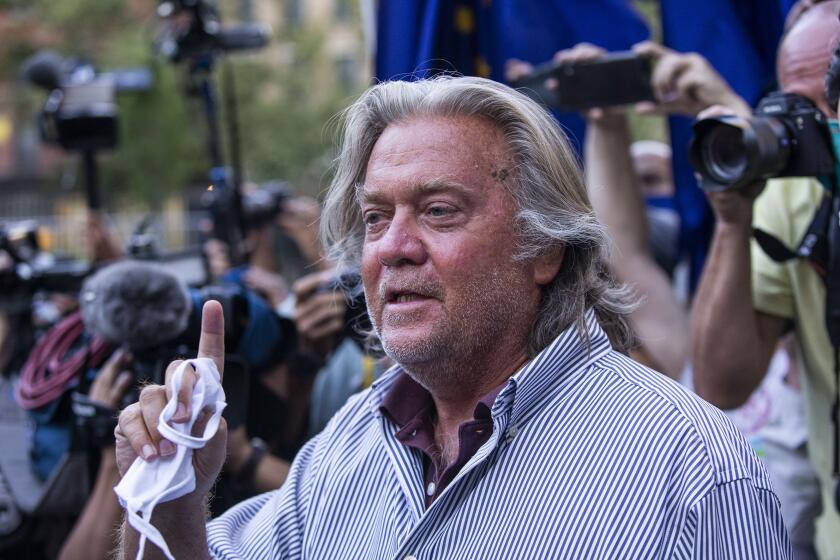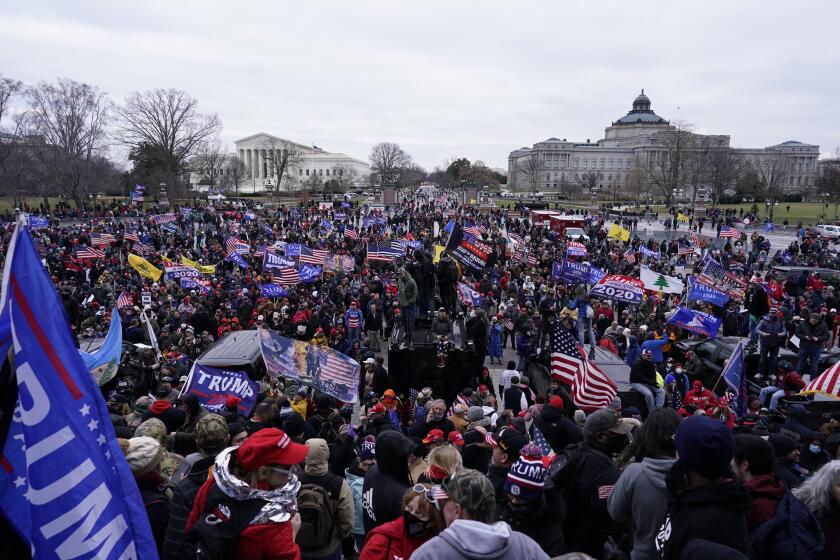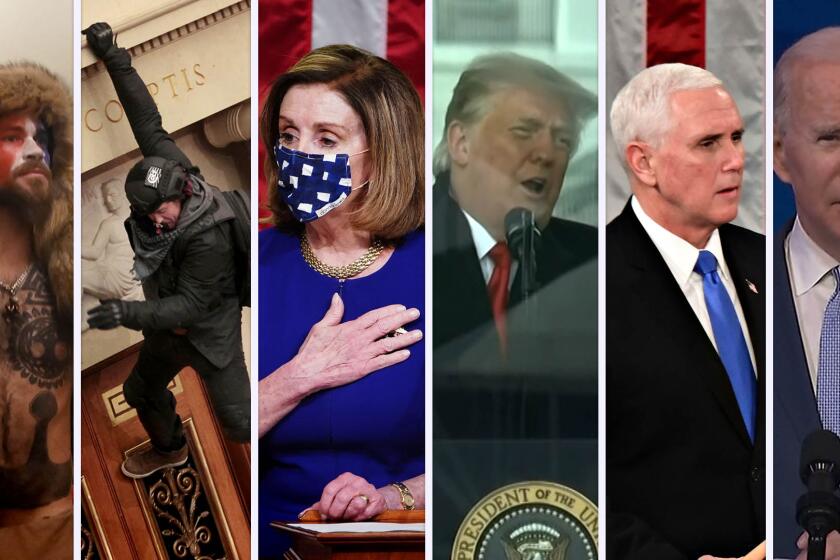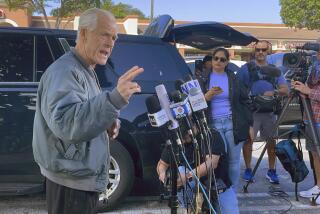House Jan. 6 panel votes to hold ex-Trump advisor Stephen Bannon in contempt
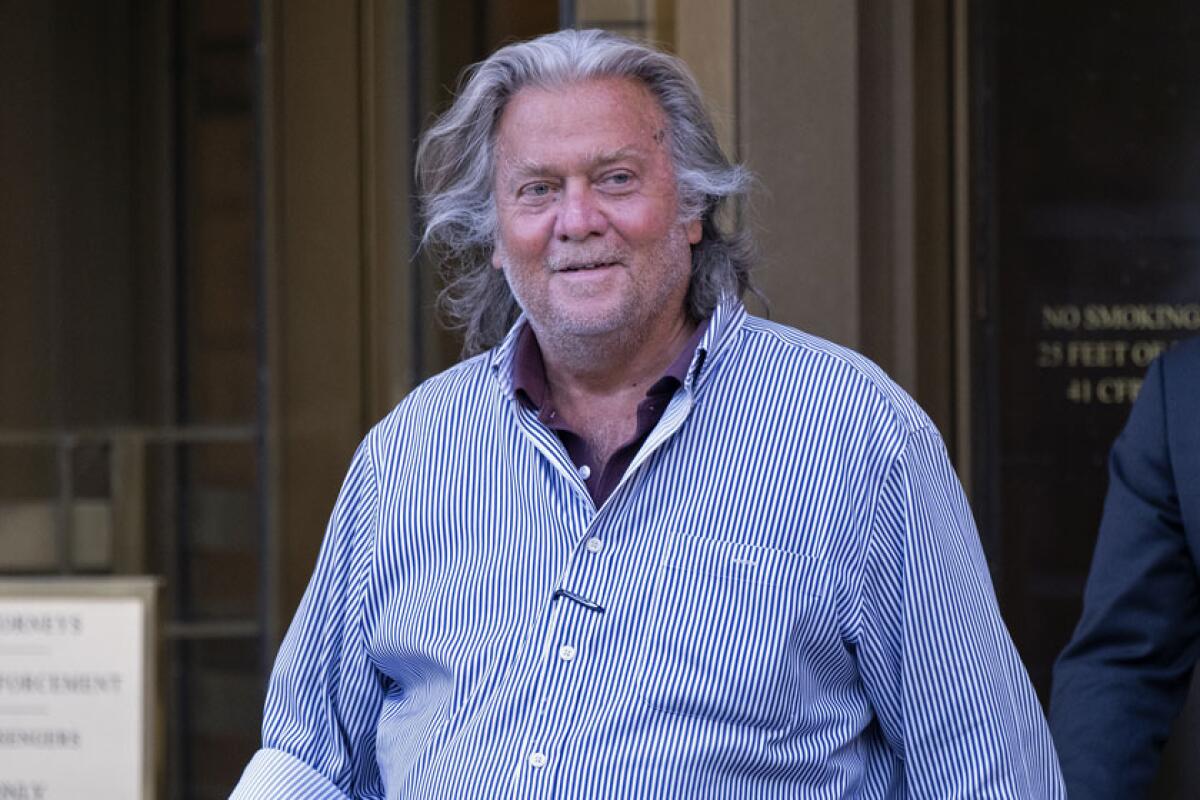
A congressional committee investigating the Jan. 6 attack on the U.S. Capitol voted Tuesday night to hold former Trump advisor Stephen K. Bannon in contempt for not cooperating with its inquiry, a significant escalation in the panel’s efforts to get answers about the insurrection from the firebrand political operative.
The vote comes as the House panel is running into stiff resistance from former President Trump, who has told allies and associates not to cooperate with the inquiry. On Monday, Trump launched a legal battle to stop the committee from obtaining records from his time in the White House, arguing in a federal lawsuit that the House committee is on a “vexatious, illegal fishing expedition.”
The special House committee has been tasked with uncovering what led to the melee by a pro-Trump mob that resulted in five deaths, injured scores of police officers and interrupted the certification of President Biden’s electoral victory. The panel has sought testimony and records from a broad array of former Trump administration officials. Bannon helped run Trump’s 2016 campaign and served briefly in the White House but was a private citizen in the run-up to the riot.
“The plain fact here is that Mr. Bannon has no legal right to ignore the committee’s lawful subpoena,” said Rep. Liz Cheney (R-Wyo.), vice chair of the House Select Committee to Investigate the January 6th Attack on the United States Capitol.
In refusing to cooperate, Bannon may be seeking to shield Trump, Cheney added.
“Mr. Bannon and Mr. Trump’s privilege arguments ... appear to reveal one thing,” she said. “They suggest that President Trump was personally involved in the planning and execution of Jan. 6, and this committee will get to the bottom of that.”
The committee had demanded documents and testimony from Steve Bannon, who was in touch with Trump before the Jan. 6 insurrection at the Capitol.
The panel’s unanimous contempt vote stemmed from Bannon’s defiance of the committee’s subpoena seeking records and a deposition, scheduled for last week. Bannon’s attorney, Robert Costello, said in a letter to the committee that Bannon would not comply with the subpoena until lawmakers reached an agreement with Trump or a court rules on the matter.
Costello cited a letter he received from Trump’s attorney requesting that Bannon assert executive privilege, a legal doctrine that has allowed presidents to withhold certain confidential communications from public disclosure.
Costello did not respond Tuesday to an email seeking comment on the committee’s vote on his client.
The committee voted on a resolution, released Monday, that recommended the House hold Bannon in contempt of Congress for defying its subpoena. If the full House votes to endorse the resolution, Bannon will be referred to the Justice Department for possible prosecution. That vote could come as soon as this week.
The resolution asserts that Bannon “had multiple roles relevant to this investigation, including his role in constructing and participating in the ‘stop the steal’ public relations effort that motivated the attack, [and] his efforts to plan political and other activity in advance of January 6th.”
It noted that Bannon had urged Trump supporters to “take dramatic action,” and said on his podcast on Jan. 5 that “all hell is going to break loose tomorrow.”
Bannon was right. The next day, hundreds of Trump supporters forced their way into the Capitol and beat police officers, some chanting, “Hang Mike Pence!” after Trump called out his vice president for refusing to try to overturn the electoral college vote. The mob forced Pence and lawmakers to evacuate both chambers of Congress and hide for their safety.
Tweets and time stamps offer a timeline of the events that led to a pro-Trump mob storming the Capitol building hours after the president spoke at a rally nearby.
The resolution also argued that Bannon, who held no government role in January, had no legal basis to ignore the committee’s subpoena, noting that it was not seeking information on official government matters, but rather on “efforts to overturn legitimate election results and an attack on our democratic institutions.”
“It’s shocking to me — shocking that anyone would not do anything in their power to assist our investigation,” committee Chair Bennie Thompson (D-Miss.) said before the nine-member panel voted on the resolution. “So it’s a shame that Mr. Bannon has put us in this position, but we won’t take no for an answer.”
Rep. Adam B. Schiff (D-Burbank), a committee member, said in a statement: “Bannon’s unwillingness to cooperate with our committee leaves us no choice but to hold him in criminal contempt.”
While taking action against Bannon, the committee has been negotiating with other former Trump advisors to obtain their records and testimony.
Among the others the panel seeks to question are former White House Chief of Staff Mark Meadows, former Pentagon aide Kashyap Patel and Dan Scavino, a former White House aide who was close to Trump. The committee is also seeking records from Jeffrey Clark, a former top Justice Department official. A report by the Senate Judiciary Committee alleged that Clark was involved in efforts to help Trump overturn the election results.
Legal experts say Bannon does not have much of a case for defying his subpoena. It seems more likely, they said, that he is hoping to delay proceedings, perhaps until Republicans potentially take over the House after the midterm election next year. If that were to happen, the committee’s investigation would almost surely end. Experts also say Bannon may be seeking to curry favor with Trump’s most die-hard supporters.
“His defiance may end up with him getting a fine or a jail sentence, but it will also enhance his credibility” among Trump’s supporters, said Norman Eisen, a senior fellow at the nonpartisan Brookings Institution who represented the House Judiciary Committee during Trump’s first impeachment proceeding. “He is playing to the peanut gallery while also hoping for a delay.”
It is not clear whether the Justice Department would prosecute Bannon, who could face a $100,000 fine and a year in jail if convicted of obstructing Congress. But it would not be Bannon’s first time in federal prosecutors’ crosshairs. He was charged in August 2020 with federal fraud and money laundering in an alleged scheme to defraud supporters of the president’s U.S.-Mexico border wall. Trump, in the last hours of his presidency, pardoned Bannon.
Ross Garber, an adjunct professor at Tulane Law School, said prosecuting Bannon could prove to be difficult because the Justice Department would have to show he willfully obstructed Congress. Bannon could argue he was following legal advice and was respecting the request of a former president, Garber said.
“A prosecution of Bannon is not a slam-dunk,” he added.
Biden said Friday he hoped “the committee goes after them and holds them accountable,” referring to Bannon and others who might defy congressional subpoenas. Biden added that he believed federal prosecutors should seek to try those who defy the subpoenas.
Biden’s remarks prompted a swift reply from Anthony Coley, a Justice Department spokesman, who said the “Department of Justice will make its own independent decisions in all prosecutions based solely on the facts and the law. Period. Full stop.”
Biden said during last year’s campaign that he would not interfere in Justice Department matters, in contrast with Trump’s practice as president.
Trump has aggressively sought to stymie the House investigation, going beyond pressuring former advisors and associates not to cooperate. In a statement Tuesday, he said Democratic and Republican lawmakers on the committee were “absolute political hacks who want to destroy the Republican Party and are decimating America itself. I am the only thing in their way.”
The former president’s belligerent talk came a day after he filed a federal lawsuit seeking to block the committee from accessing his administration’s records in the National Archives. The suit alleges that the committee’s requests are “unprecedented in their breadth and scope and are untethered from any legitimate legislative purpose.”
The lawsuit also attacks Biden, accusing the president of engaging in a “political ploy” to help his “partisan allies” by refusing to assert executive privilege to block Congress’ access to Trump administration documents.
Biden’s White House counsel told the National Archives on Oct. 8 that the president would not seek to block access to a tranche of records sought by the committee because “the insurrection that took place on January 6, and the extraordinary events surrounding it, must be subject to a full accounting to ensure nothing similar ever happens again.”
“Congress has a compelling need in service of its legislative functions to understand the circumstances that led to these horrific events,” White House Counsel Dana Remus wrote.
Legal experts say Trump’s lawsuit faces an uphill battle for a host of reasons, though the law underpinning claims of executive privilege is unsettled.
Courts frequently defer to a current president’s arguments for privilege, but are less likely to consider claims from former presidents. And judges may be hesitant to rule that executive privilege covers actions outside the scope of a president’s duties, such as those during an insurrection.
“It’s not a great claim for a host of reasons,” said Garber, the Tulane law professor.
More to Read
Get the L.A. Times Politics newsletter
Deeply reported insights into legislation, politics and policy from Sacramento, Washington and beyond. In your inbox three times per week.
You may occasionally receive promotional content from the Los Angeles Times.
